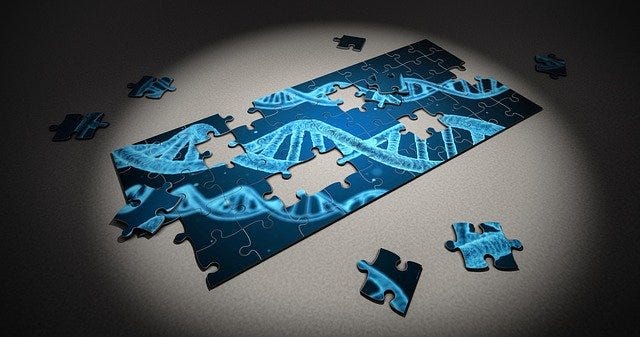The Implications of Gene Editing: The Path to Designer Babies
Written on
Advancements in Genetic Engineering
Every year, new research emerges that showcases increasingly effective methods for regulating gene expression in various organisms, including humans. While the potential to reduce disabilities and diseases is promising, there are significant concerns about the possible misuse of these technologies.
Since 2012, scientists have been utilizing specific bacterial mechanisms to edit genes across species, offering a fascinating glimpse into our future. The rapid advancements in CRISPR technology have led to numerous controversial studies that tread a fine line between ethical conduct and scientific exploration. The pace of research is so swift that ethical and legal frameworks struggle to keep pace.

DNA Editing Technology — Source — Pixabay
While the majority of researchers are likely motivated by noble intentions aimed at enhancing human health, the influence of financially driven interests cannot be ignored. Among the notable recent successes, CRISPR has demonstrated effectiveness in lessening genetic deafness in mice, prolonging the color retention of mushrooms, and treating sickle-cell anemia in murine bone marrow cells. With the ability to manipulate genes becoming more precise, there is potential to eradicate diseases like malaria by engineering gene drives that disrupt the reproductive capabilities of mosquitoes that carry the pathogen.
A research team at Imperial College London is currently testing these methods in regions of Africa heavily affected by malaria. Their approach involves breeding genetically modified insects that will propagate their altered genes within the local mosquito populations, either sterilizing future generations or making them resistant to malaria.
While this innovative technique offers the prospect of reducing child mortality rates from malaria, it also raises concerns about unforeseen ecological impacts on local food webs and environments. The benefits may outweigh the environmental risks, but thorough testing remains essential.
CRISPR's Broader Implications
A team led by Heather Whitney at Bristol University has devised a concerning method for deploying the CRISPR gene-editing system. Their approach involves a simple handheld sprayer, with aspirations to eventually utilize aerial crop dusters for widespread application.
The ramifications of this technology are profound. If a government were to authorize the aerial distribution of genetically modified organisms, it could pose threats beyond agricultural contexts, presenting new opportunities for bioweapons to be used by malicious actors.

Crop Duster in Action — Source — Pixabay
Scientists at Duke University have successfully harnessed CRISPR to target and silence genes in human papillomavirus. Moreover, the controversial birth of three children in China with CRISPR-edited genomes was reported by He Jiankui in November 2018. The twin girls were claimed to be resistant to HIV, but the attention garnered by their case overshadowed the many failed attempts that likely preceded this success.
Recent reports in The New Scientist indicate that Denis Rebrikov, a Russian biologist, plans to continue using CRISPR to prevent hereditary deafness, despite warnings from the International Commission on the Clinical Use of Human Germline Genome Editing about the risks involved in human trials. The CRISPR process, particularly involving the Cas9 enzyme, is not consistently reliable. The DNA can misrepair itself, leading to nonfunctional genes or even uncontrolled cell growth, which may result in cancer.
In summary, while the potential of human CRISPR editing is tantalizing, its current application poses significant health risks and ethical dilemmas.
Ethical Concerns and Future Directions
Despite guidelines established by a consortium of doctors, biologists, and ethicists, the governance of human gene editing remains fragmented, relying on the regulatory frameworks of individual countries. Stakeholders with vested interests may disregard ethical concerns, particularly where military applications of gene editing are involved.
Two scientists have already disregarded responsible use guidelines, raising questions about how many more may be engaging in similar practices in secret.

Ethical Implications of Genetic Manipulation — Source — Pixabay
As Francis Collins, Director of the National Institute of Health, remarked, the experimentation conducted by He Jiankui was “profoundly disturbing and tramples on ethical norms.” If researchers do not adhere to ethical standards, who will safeguard against future violations?
It is crucial to elevate awareness of these ethical breaches, which could be considered akin to war crimes. The question remains: how can we justify altering the genetic makeup of unborn children, hoping that a few will survive to validate the experiment? What about those born with genetic disorders? The human cost of pursuing designer babies is staggering, and the suffering inflicted on mothers is equally troubling.
These issues are often overlooked in prestigious scientific publications and deemed unworthy of attention in mainstream media. If society continues to turn a blind eye to the emergence of sophisticated bioterrorism, we may be heading toward a dire future.
The ethical dilemma of designer babies | Paul Knoepfler - YouTube
This video discusses the moral complexities surrounding the advent of designer babies, exploring both the potential benefits and ethical concerns associated with gene editing.
How Close Are We to Designer Babies? - YouTube
This video examines the advancements in gene editing technology and assesses how close we are to realizing the concept of designer babies.